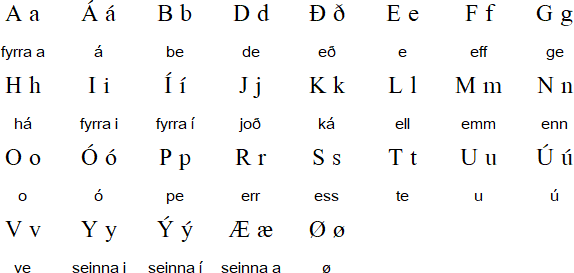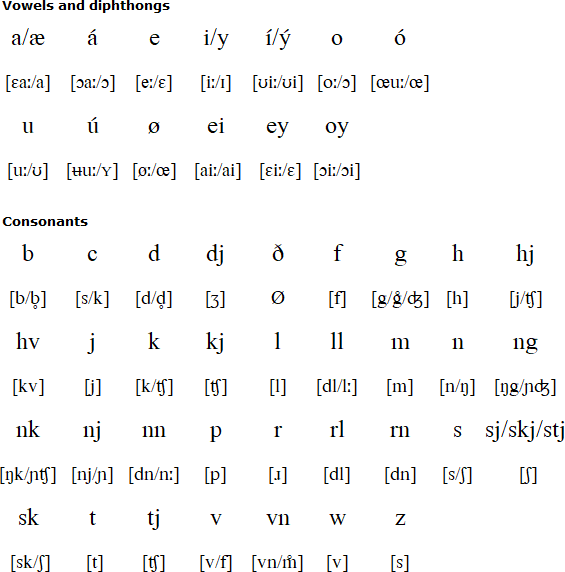Faroese is a North Germanic language spoken mainly in the Faroe Islands (Føroyar) In 2007 there were about 66,000 speakers of Faroese: 45,000 in the Faroe Islands, and 21,000 elsewhere, mainly in Denmark.
Faroese is closely related to Icelandic, and the dialects of western Norway. However, as a result of the isolation, Faroese has a distinctive character of its own. Icelandic speakers can apparently read Faroese without too many difficulties, but may not understand the spoken language so well.
According to the Færeyinga saga (Saga of the Faroe Islanders), which was written in Iceland, Grímur Kamban, a Norwegian Viking, was the first person to reach the Faroe Islands in 825 AD. His name is thought to be of Celtic origin, possibly from the Old Irish cambán ("crooked one"), and he may have come from the Norse colonies in Ireland [source]. However, Irish monks were in the Faroe Islands from about 625 AD, long before Grímur Kamban. The monks left after Vikings started raiding the islands, and settling in them from 825 AD.
The Viking settlers spoke Old Norse, or the Dǫnsk tunga (Danish tongue), and came from Norse colonies in Ireland, Orkney, Shetland, and other parts of the British Isles. Many brought Irish wives with them, and there is thought to be some influence from the Irish language on Faroese. Faroese started to emerge as a distinct language between the 9th and 15th centuries.
Faroese first appeared in writing during the 14th century, mainly in the form of sagas and fables, which remain popular to this day. It was written with a spelling system similar to Icelandic and Norwegian. From 1536 the use of Faroese was prohibited by the Danish authorities in schools, churches and official documents. However, the Faroese people continued to speak the language.
A standard written form for Faroese was devised in 1854 by Venceslaus Ulricus Hammershaimb (1819-1909) and Jón Sigurðsson (1811-1879). It was based on Old Norse and Icelandic, and enabled readers to see the etymology of words clealy. However, the pronunciation of Faroese had changed significantly, and the orthography did not reflect this. A more phonetic spelling system, devised by Jakob Jakobsen (1864-1918), did not prove popular.
Modern Faroese literature began to appear in the early 19th century, One of the first writers was Nólsoyar Páll, who wrote many poems. The first Faroese newspaper, Føringatiðindi, was published in 1890.
Faroese became the official language of education in the Faroe Islands, replacing Danish, in 1937. The following year Faroese started to be used in churches, and it became the national language of the Faroe Islands in 1948. During the 1980s Faroese started to be used in media and advertising. About 5% of the people in the Faroe Islands speak Danish as their mother tongue, and children have to learn it in school.

Source: http://home.unilang.org/wiki3/index.php/Faroese_alphabet
Hear the Faroese alphabet pronounced:

Download an alphabet chart for Faroese (Excel)
Sources: Unilang & Føroysk-Ensk orðabók Faroese-English dictionary by George Vaughan Chichester Young, Cynthia R. Clewer
Øll menniskju eru fødd fræls og jøvn til virðingar og mannarættindi. Tey hava skil og samvitsku og eiga at fara hvørt um annað í bróðuranda.
All human beings are born free and equal in dignity and rights. They
are endowed with reason and conscience and should act towards one another
in a spirit of brotherhood.
(Article 1 of the Universal Declaration of Human Rights)
Information about Faroese | Phrases | Numbers | Time | Family words | Tower of Babel
Information about the Faroese language
http://en.wikipedia.org/wiki/Faroese_language
http://www.mundofree.com/islasferoe/thefaroeselanguage.html
Online Faroese lessons
http://www.ielanguages.com/faroese.html
http://en.wikibooks.org/wiki/Faroese
http://www.stidin.fo/FaroeseCourse/
https://faroeseonline.com/
Faroese pronunciation
http://home.unilang.org/wiki3/index.php/Faroese_pronunciation
http://www.faroeislands.com/Default.asp?sida=655
Online Faroese dictionaries
https://sprotin.fo
http://www.freelang.net/online/faroese.php
http://www.whotww.majstro.com/dictionaries/English-Faeroese/
http://www.cykelkurt.com/fugle/faroerne/ordbog-faroerne.html
Online Faroese phrases
http://www.ielanguages.com/faroese.html
http://home.unilang.org/wiki3/index.php/Faroese_basic_phrases
http://www.framtak.com/info/sounds.html
Online Faroese radio
http://www.uf.fo
http://www.kringvarp.fo
Faroe Islands Information (in English and Faroese) - includes information on the Faroese language: http://www.framtak.com/
faroeweb.com - your gateway to the Faroe Islands (in English)
http://www.faroeweb.com
Faroe Islands Tourist Guide (in English, German and Danish)
http://www.faroeislands.com
Afrikaans, Alsatian, Bavarian, Cimbrian, Danish, Dutch, Elfdalian, English, Faroese, Flemish, Frisian (East), Frisian (North), Frisian (Saterland), Frisian (West), German, Gothic, Gottscheerish, Gronings, Hunsrik, Icelandic, Limburgish, Low German, Luxembourgish, Mòcheno, Norn, Norwegian, Old English, Old Norse, Pennsylvania German, Ripuarian, Scots, Shetland(ic), Stellingwarfs, Swabian, Swedish, Swiss German, Transylvanian Saxon, Värmlandic, Wymysorys, Yiddish, Yola, Zeelandic
Languages written with the Latin alphabet
Page last modified: 26.09.21
[top]
You can support this site by Buying Me A Coffee, and if you like what you see on this page, you can use the buttons below to share it with people you know.

If you like this site and find it useful, you can support it by making a donation via PayPal or Patreon, or by contributing in other ways. Omniglot is how I make my living.
Note: all links on this site to Amazon.com, Amazon.co.uk
and Amazon.fr
are affiliate links. This means I earn a commission if you click on any of them and buy something. So by clicking on these links you can help to support this site.
[top]